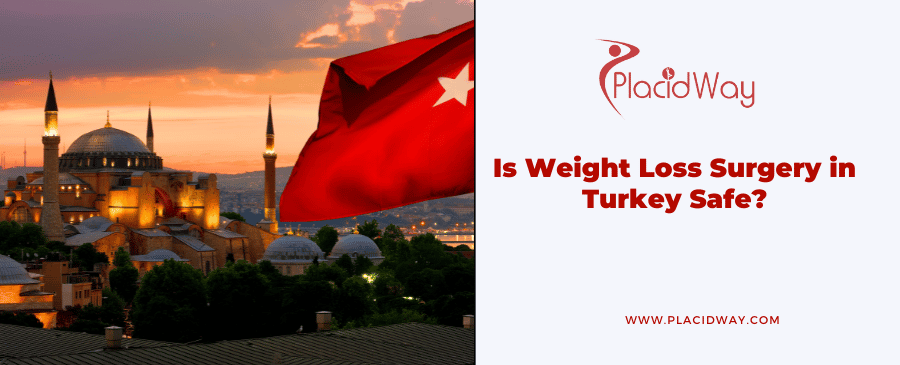Exploring the Safety Standards of Weight Loss Surgery in Turkey

Weight loss surgery, also known as bariatric surgery, has become a popular and effective solution for individuals struggling with obesity and its associated health issues. Turkey has emerged as a significant destination for medical tourism, attracting patients seeking these procedures due to competitive pricing and perceived high-quality care. This blog post aims to thoroughly answer common questions about the safety, procedures, and considerations for weight loss surgery in Turkey, helping you make an informed decision. We will delve into the details that matter most to patients, from safety standards to post-operative care, to ensure you have a comprehensive understanding of what to expect.
Is Weight Loss Surgery in Turkey Generally Safe?
"Weight loss surgery in Turkey is generally safe when performed in JCI-accredited hospitals by experienced bariatric surgeons who adhere to international standards of care."
While no surgery is entirely risk-free, many clinics and hospitals in Turkey offering weight loss surgery maintain high safety standards comparable to those in Western countries. This is often due to international accreditations, such as those from the Joint Commission International (JCI), which signifies adherence to rigorous quality and patient safety guidelines. Many Turkish surgeons also have extensive training and experience, often having received parts of their education in Europe or the US. However, it is paramount for patients to conduct thorough research and verify the credentials of both the facility and the surgeon to ensure they are choosing a reputable provider. The safety of the procedure heavily relies on the quality of the medical facility, the expertise of the surgical team, and the comprehensive nature of pre and post-operative care.
What are the main types of Weight Loss Surgery offered in Turkey?
"The main types of weight loss surgery offered in Turkey include gastric sleeve surgery, gastric bypass surgery, mini gastric bypass, and gastric balloon placement."
These procedures vary in how they help achieve weight loss. Gastric sleeve surgery, or sleeve gastrectomy, involves removing a significant portion of the stomach, creating a smaller, tube-shaped stomach. This reduces the amount of food the stomach can hold and also impacts hunger-regulating hormones. Gastric bypass surgery (Roux-en-Y gastric bypass) creates a small stomach pouch and reroutes a portion of the small intestine, limiting food intake and nutrient absorption. Mini gastric bypass is a simplified version of the gastric bypass. The gastric balloon is a less invasive, temporary procedure where a balloon is inserted into the stomach and inflated to promote a feeling of fullness. Each procedure has its own set of benefits, risks, and suitability criteria, which should be discussed in detail with a qualified surgeon.
How do I choose a safe and reputable clinic for Weight Loss Surgery in Turkey?
"To choose a safe and reputable clinic for weight loss surgery in Turkey, look for JCI accreditation, verify the surgeon's experience and qualifications, check for patient testimonials, and ensure comprehensive aftercare is provided."
Choosing the right clinic is critical for a safe and successful outcome. First, prioritize clinics and hospitals that have international accreditations like JCI (Joint Commission International). This indicates that the facility meets global healthcare quality and safety benchmarks. Second, thoroughly research your surgeon's background, including their years of experience, the number of procedures they have performed, and their affiliations with international surgical organizations. Reading patient testimonials and reviews on independent platforms can also provide valuable insights. Finally, confirm that the clinic offers a comprehensive package that includes pre-operative assessments, the surgery itself, and detailed post-operative care and follow-up, which is crucial for long-term success and managing any potential complications.
What are the potential risks of Weight Loss Surgery in Turkey?
"The potential risks of weight loss surgery in Turkey, as with any surgical procedure, include infection, bleeding, anesthesia complications, leakage from staple lines, nutrient deficiencies, and in rare cases, death."
While serious complications are rare, it's important to be aware of them. Risks common to any surgery include infection at the incision site, excessive bleeding, and adverse reactions to anesthesia. Specific to bariatric surgery, there's a risk of gastric leaks from the staple lines, which can be severe. Long-term risks can include nutrient deficiencies due to altered absorption, gallstones, hernias, or issues like "dumping syndrome" where food moves too quickly through the digestive system, causing nausea, dizziness, and diarrhea. Some reports from government agencies have highlighted instances of complications and, in very rare cases, deaths among patients who have traveled for bariatric surgery, emphasizing the need for extreme caution and thorough vetting of providers.
What is the average cost of Weight Loss Surgery in Turkey compared to other countries?
"The average cost of weight loss surgery in Turkey is significantly lower, typically ranging from $3,000 to $6,000 for procedures like gastric sleeve, making it considerably more affordable than in Western countries where similar procedures can cost upwards of $15,000 to $30,000."
One of the primary reasons patients choose Turkey for weight loss surgery is the cost-effectiveness. This lower price point does not necessarily indicate a compromise in quality, but rather reflects the lower operational costs and cost of living in Turkey. However, patients should be wary of prices that seem "too good to be true," as these might be indicative of clinics cutting corners on crucial safety measures, equipment, or staff qualifications. It's essential to understand exactly what is included in the quoted price, such as pre-operative tests, hospital stay, post-operative medications, and follow-up care.
What kind of aftercare and follow-up should I expect after Weight Loss Surgery in Turkey?
"After weight loss surgery in Turkey, you should expect a hospital stay of a few days, followed by a liquid diet, gradual reintroduction of solid foods, and a comprehensive long-term follow-up plan with nutritional and psychological support."
Effective aftercare is crucial for the success and safety of bariatric surgery. Typically, patients will stay in the hospital for 2-4 days for initial monitoring. Upon discharge, a strict dietary progression from liquids to pureed foods and then soft solids will be prescribed. Long-term, patients will need to adhere to a revised diet, take vitamin and mineral supplements to prevent deficiencies, and engage in regular physical activity. Reputable clinics in Turkey should offer a structured follow-up program, including virtual consultations with surgeons, dietitians, and potentially psychologists, to monitor progress, address complications, and provide ongoing support for lifestyle changes. Without adequate follow-up, the long-term success and safety of the surgery can be compromised.
What are the success rates of Weight Loss Surgery in Turkey?
"The success rates for weight loss surgery in Turkey, particularly for procedures like gastric sleeve and gastric bypass, are generally high, with many patients achieving a loss of 60-80% of their excess body weight within 12-18 months."
Success in weight loss surgery is often defined as achieving significant excess weight loss and maintaining it long-term, along with improvement or resolution of obesity-related health conditions. Clinics in Turkey often report high success rates, aligning with international statistics for these procedures. For instance, gastric sleeve surgery can lead to an average excess weight loss of 60-70%, while gastric bypass can result in 70-80% excess weight loss. However, these outcomes are highly dependent on the patient's adherence to post-operative dietary guidelines, exercise, and long-term follow-up. It's important to discuss realistic expectations with your surgeon.
Are Turkish bariatric surgeons well-qualified and experienced?
"Many Turkish bariatric surgeons are highly qualified and experienced, often having received international training and certifications, and perform a significant volume of weight loss surgeries."
Turkey has invested heavily in its medical infrastructure and training programs, leading to a pool of skilled medical professionals. Numerous bariatric surgeons in Turkey have trained in leading institutions in Europe and the United States, and many are members of international surgical associations. The high volume of medical tourism also means that Turkish surgeons gain extensive experience performing various weight loss procedures. However, as with any medical destination, the quality can vary. It is essential for patients to verify the individual surgeon's credentials, specialization, and track record. Look for surgeons who are board-certified and have a focus specifically on bariatric and metabolic surgery.
What are the pre-operative requirements for Weight Loss Surgery in Turkey?
"Pre-operative requirements for weight loss surgery in Turkey typically include a Body Mass Index (BMI) of 30 or higher (often 35+ with co-morbidities), comprehensive medical evaluations, blood tests, and psychological assessments."
Before undergoing weight loss surgery in Turkey, patients will undergo a thorough screening process to determine their suitability for the procedure. This generally includes a detailed review of their medical history, physical examination, various blood tests, cardiac evaluations (like ECG), and potentially imaging studies (e.g., ultrasound, X-rays). A psychological assessment is often required to ensure the patient is mentally prepared for the significant lifestyle changes required post-surgery. Some clinics may also require a specific period of diet and exercise pre-operatively to demonstrate commitment and initiate weight loss. These assessments are crucial for patient safety and to optimize surgical outcomes.
How long should I plan to stay in Turkey for Weight Loss Surgery?
"Patients typically need to plan a stay of 7 to 10 days in Turkey for weight loss surgery, which includes pre-operative consultations, the surgery itself, and a few days of hospital and initial recovery."
This duration allows for adequate time for initial assessments, the surgical procedure, and crucial immediate post-operative monitoring in the hospital. Following hospital discharge, an additional few days are generally recommended for recuperation in a hotel before flying home. This period also allows for any initial follow-up appointments or addressing minor concerns under the direct supervision of the surgical team. Patients should avoid rushing their departure to ensure they are stable and well enough for travel.
What are common long-term considerations after Weight Loss Surgery in Turkey?
"Common long-term considerations after weight loss surgery in Turkey include lifelong adherence to a modified diet, consistent intake of vitamin and mineral supplements, regular physical activity, and ongoing medical follow-ups to manage potential complications and ensure sustained weight loss."
Weight loss surgery is not a quick fix; it's a tool that requires lifelong commitment to new habits. Patients will need to significantly alter their eating patterns, focusing on protein-rich foods, small portions, and avoiding sugary or high-fat items. Due to altered nutrient absorption, daily supplementation with multivitamins, calcium, vitamin D, iron, and vitamin B12 is crucial to prevent deficiencies. Regular exercise is also vital for maintaining weight loss and improving overall health. Long-term medical follow-ups, ideally with a bariatric specialist, are necessary to monitor health, manage any emerging complications, and provide support for psychological adjustments to body changes.
Are there any specific travel warnings or advice for medical tourists going to Turkey for Weight Loss Surgery?
"Some governmental bodies have issued travel warnings for medical tourism in Turkey, advising thorough research and caution due to concerns about unregulated clinics, potential for inadequate aftercare, and differing legal frameworks."
While many reputable clinics operate safely, some foreign government agencies, such as the UK's Foreign, Commonwealth & Development Office (FCDO), have published advice highlighting potential risks associated with medical tourism in Turkey. These concerns often revolve around the varying standards of care, the difficulty in discerning between regulated and unregulated clinics, the potential for insufficient post-operative support once the patient returns home, and differences in legal recourse if complications arise. It is always recommended to consult your country's official travel advisories and consider travel insurance that covers medical emergencies and complications from overseas procedures.
How does the accreditation process for Turkish hospitals impact patient safety?
"The accreditation process for Turkish hospitals, particularly through organizations like Joint Commission International (JCI), significantly enhances patient safety by ensuring adherence to stringent international standards for quality of care, infection control, facility management, and patient rights."
JCI accreditation is a global benchmark for healthcare quality and patient safety. When a Turkish hospital receives JCI accreditation, it means they have undergone a rigorous evaluation process covering thousands of standards, from surgical protocols and patient identification to medication management and emergency preparedness. This commitment to international standards provides a higher level of assurance regarding the quality of care, reducing the risk of medical errors, infections, and other adverse events. Choosing a JCI-accredited facility for weight loss surgery in Turkey is a strong indicator of a commitment to patient safety.
What are the benefits of choosing Weight Loss Surgery in Turkey besides cost?
"Besides cost, benefits of choosing weight loss surgery in Turkey include access to state-of-the-art medical facilities, highly skilled surgeons, shorter waiting times, and the opportunity to combine treatment with a tourism experience."
Turkey has invested heavily in modernizing its healthcare infrastructure, with many hospitals boasting advanced technology and equipment. This means patients often have access to cutting-edge surgical techniques, such as laparoscopic surgery, which can lead to less pain and faster recovery. The shorter waiting times for procedures compared to some Western healthcare systems are also a significant draw. Furthermore, many patients appreciate the opportunity to combine their medical trip with a cultural or leisure experience, making the overall journey more appealing. However, the primary focus should always remain on medical safety and quality.
What should I do if complications arise after returning home from Weight Loss Surgery in Turkey?
"If complications arise after returning home from weight loss surgery in Turkey, immediately seek medical attention from your local healthcare provider and inform them of your recent surgery, providing all available medical records from Turkey."
It is vital to have a plan in place for potential complications, even if rare. In case of unexpected symptoms or issues, contact your local doctor or emergency services without delay. Ensure you bring all relevant medical documents, including discharge summaries, surgical reports, and medication lists, from your Turkish clinic. While some Turkish clinics offer remote follow-up, having local medical support is essential for immediate and ongoing care. Be aware that your home country's healthcare system may have different protocols for managing complications from overseas procedures.
Explore PlacidWay for solutions related to medical tourism, healthcare services, or other relevant offerings.


.png)






.png)
.png)






Share this listing